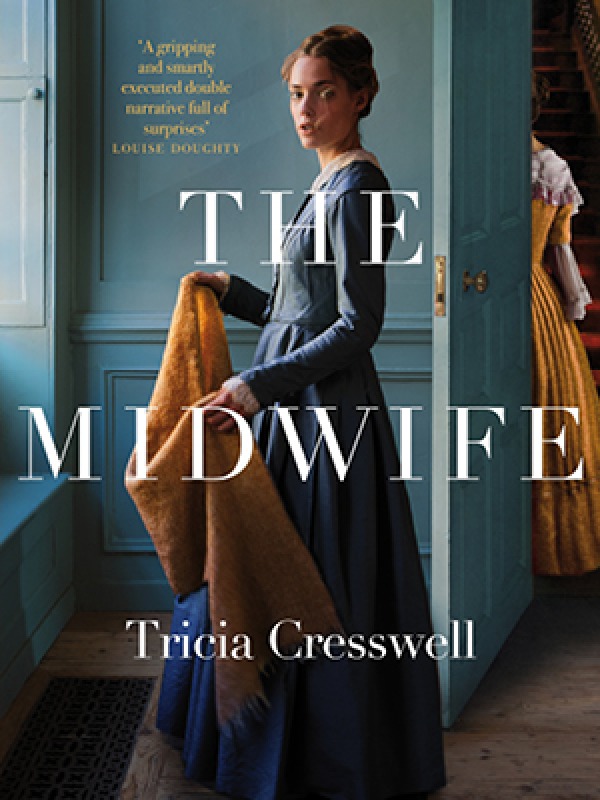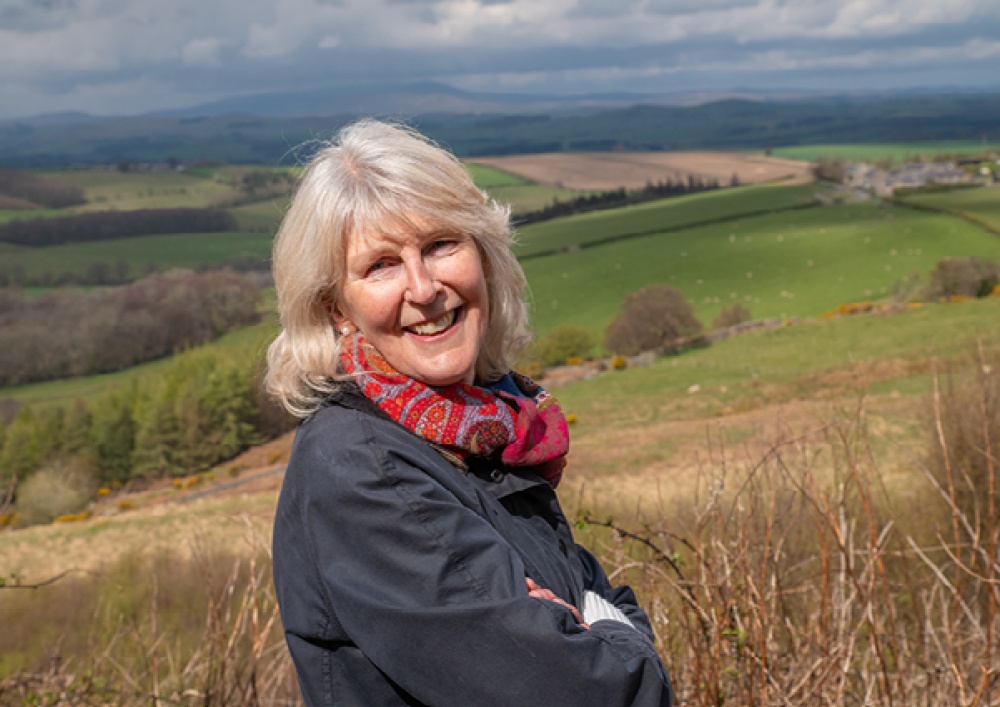
The Midwife, published by Pan Macmillan, is available in all good bookstores now.
Join Our World... Sign up for our exclusive newsletter.

Be inspired every day with Living North


Tricia Cresswell, a retired public health doctor and charity trustee, moved from Newcastle to Alnwick and realised her dream of writing fiction. Her debut novel, The Midwife, was released following a Creative Writing MA at Newcastle University and won the Mslexia Debut Novel Award in 2020. It’s a hauntingly honest historical work of fiction with an important message.
It’s 1838. After a violent storm, a woman is found alone on the Northumberland moors with no memory. All she knows is how to help women in labour, how to expertly dress a wound, and how to speak French, and she’s forced to rebuild her life from scratch by using these skills to help others. Meanwhile in 1841, Dr Borthwick is delivering babies to mothers in high society London. But there’s a dark secret from his past that he’s hiding.
‘I’ve always wanted to write; you know how you have these vague dreams from being a girl,’ Tricia reveals. ‘I’ve been a voracious reader all my life. It’s been a great comfort to me. When I was busy or unable to sleep, I’d always read. I’ve got loads of books. My dad was really into 50s science fiction and when he died I inherited some of that collection, and I’ve always loved historical fiction.’
Throughout Tricia’s professional life, she’s always learned what to do before she tries something. ‘It was good for me to do it that way round – to learn the craft of writing, and the technical skills,’ she says. Having supervised plenty of students’ masters in public health, Tricia returned to university where the tables turned. ‘Being supervised was fascinating. The students were lovely. There was a real mix in ages – some obviously very young, some teachers, and some who were retired.’
The Midwife’s dual narrative makes the tale all the more gripping, and the underlying focus on women’s reproductive rights is just as important to highlight today as it was back then, as Tricia explains. ‘I’d had an idea of the dual narrative fairly early on, and also how the book would end. Then it was just a case of sitting down and writing it. I wanted to focus on how women across the world are able to access the care they need: contraception, safe abortions, healthcare in pregnancy, in labour, and care afterwards for mother and baby,’ she says. ‘Very much healthcare that we now take for granted (as we should) – but that isn’t available for all women in the world. Deciding to set it in the 1840s was down to the history at the time, which is very interesting in terms of where medicine and healthcare was (or wasn’t). It was a time I knew a bit about already.’
The story shows how awful things were for pregnant women during that period. ‘In 1840, the UK maternal death rate was estimated to be around 700 in every 100,000. That translates to one woman dying for every 143 babies born. Everybody would know someone who had died in childbirth and women were afraid of getting pregnant. That comes through in a lot of writing from that time. Even Jane Austen politely alludes to it. If you look to the present, in WHO figures, for women in Sub-Saharan Africa, the maternal mortality rate is around 500 per 100,000. In the UK it’s around eight per 100,000. It’s really important for us to understand that many women across the globe still don’t have those reproductive rights because they don’t have the access to care.’
With such an important message to share, all Tricia had to do was create her characters and build her story – and that inspiration came to her at home in Alnwick. ‘One day I was walking up the cobbled side of Fenkle Street and I heard the clicking noise of boot heels and I suddenly thought of a woman in a swishing skirt walking briskly along and got a really powerful image of one of the main protagonists for the book. It’s bizarre where you get your ideas from.’
The writing process wasn’t always easy though. Although Tricia had experience in writing long reports on her expert topics, the creative writing process is different. ‘There comes a point when writing your characters becomes a bit easier because you’ve created them and you know how they’re going to react,’ she explains. ‘Stories do begin to develop a bit of momentum on their own, but there is quite a complex plot in this novel so that was quite hard. Suddenly you realise you’ve said something in chapter seven that means something in chapter five can’t have happened then. Those technical challenges were fascinating.’
Thankfully, Tricia received plenty of guidance on this. ‘I did get a lot of support from my previous mentor and tutor at the university,’ she recalls. ‘I had a writing buddy too. We used to read each other’s work and criticise it, charmingly but vigorously, over lots of coffee and cake. That sort of support you get from other writers is really important, and I didn’t expect it to be easy. There were times when I could write 1,000 words a day and 500 would be almost salvageable and other times I’d write 1,000 words and think there’s two sentences there that I might like.’
All that hard work paid off when Tricia won the Mslexia Debut Novel Award. Now, her work is being celebrated in local book signings and events, including at a new local independent bookshop. ‘It was amazing timing for me when Helen Stanton opened The Accidental Bookshop in Alnwick just before Christmas,’ says Tricia. ‘She’s just amazing and it’s great to have a good independent bookshop in Alnwick. People are so excited about it. Helen is a real mover and shaker now in bookselling in Northumberland and it’s fantastic for us all to have that. You either use them or lose them. There’s a huge sense of community now too. There’s already community events taking place, and what I hadn’t realised is the good relationship Pan Macmillan have with independent booksellers too. It seems positive and enhancing for our culture.’
Between book events, Tricia is working on her next novel with her creative response to the climate emergency as inspiration. ‘There’s a bit written but I just have to try and chain myself to a desk,’ she laughs. ‘I’m going to a writing workshop in a couple of weeks to get back into it.’

The Midwife, published by Pan Macmillan, is available in all good bookstores now.
You returned to your medical work during the pandemic and volunteered as a vaccinator. Why was it so important for you to help out?
‘All of us felt we should try and do our bit and the GMC made it very easy for us to re-obtain our license to practice. People asked if you wanted to go back to work and you just had to say yes. By the time I went back into work at the end of April, people were already feeling tired and stressed. I did four months, which was great but massively time consuming. I was meant to be working three days a week but it certainly wasn’t that. You can’t not work in that situation. Afterwards, I wanted to carry on helping, so when the opportunity came to be a volunteer vaccinator, I did that too, initially with St John Ambulance who were great at training volunteers.
Because I was medically registered, I could also help out at a local practice and vaccinate the younger age groups as they came through. You’ll rarely do anything where people are more grateful.’
Your favourite thing about the North East?
‘I was originally from Leeds, so it’s not like I came up from the deep south, but I love Newcastle. It’s a vibrant city and people there work really hard to maintain that vibrancy. Northumberland is just gorgeous. When we were thinking of moving when we retired, we actually made a list of where we should move to and why. It’s the coast! We worked out that we would spend at least two or three weekends a month by the Northumberland coast, so it seemed sensible to move closer to it.’
A Northern author you admire.
‘We have so many highly successful authors! Ann Cleeves instantly springs to mind, and she’s very supportive of the North East. She sets many of her books in and around the North East, and obviously Vera is filmed across the region. Actually, although her books might not be hugely fashionable now, Catherine Cookson was a real supporter of the North East too. She was very generous to Northern charities and perhaps we forget some of those benefactors from the past.’
Could you recommend a book to our readers?
‘A book I’ve just read is Cecily by Annie Garthwaite. I love that period and it’s a fantastic book I’m recommending to all my friends.’ (Read our interview with Annie at livingnorth.com).
Who do you turn to for inspiration?
‘In recent years, it would be Barack Obama. If I was looking for a quote for a piece, I’d go to his autobiography. I’m almost all the way through the first one; he’s such a fantastic writer.’